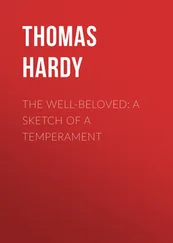“It will be fine to-morrow,” said Marty, observing them with the vermilion light of the sun in the pupils of her eyes, “for they are a-croupied down nearly at the end of the bough. If it were going to be stormy they’d squeeze close to the trunk. The weather is almost all they have to think of, isn’t it, Mr. Winterborne? and so they must be lighter-hearted than we.”
“I dare say they are,” said Winterborne.
Before taking a single step in the preparations, Winterborne, with no great hopes, went across that evening to the timber-merchant’s to ascertain if Grace and her parents would honor him with their presence. Having first to set his nightly gins in the garden, to catch the rabbits that ate his winter-greens, his call was delayed till just after the rising of the moon, whose rays reached the Hintock houses but fitfully as yet, on account of the trees. Melbury was crossing his yard on his way to call on some one at the larger village, but he readily turned and walked up and down the path with the young man.
Giles, in his self-deprecatory sense of living on a much smaller scale than the Melburys did, would not for the world imply that his invitation was to a gathering of any importance. So he put it in the mild form of “Can you come in for an hour, when you have done business, the day after to-morrow; and Mrs. and Miss Melbury, if they have nothing more pressing to do?”
Melbury would give no answer at once. “No, I can’t tell you to-day,” he said. “I must talk it over with the women. As far as I am concerned, my dear Giles, you know I’ll come with pleasure. But how do I know what Grace’s notions may be? You see, she has been away among cultivated folks a good while; and now this acquaintance with Mrs. Charmond—Well, I’ll ask her. I can say no more.”
When Winterborne was gone the timber-merchant went on his way. He knew very well that Grace, whatever her own feelings, would either go or not go, according as he suggested; and his instinct was, for the moment, to suggest the negative. His errand took him past the church, and the way to his destination was either across the church-yard or along-side it, the distances being the same. For some reason or other he chose the former way.
The moon was faintly lighting up the gravestones, and the path, and the front of the building. Suddenly Mr. Melbury paused, turned ill upon the grass, and approached a particular headstone, where he read, “In memory of John Winterborne,” with the subjoined date and age. It was the grave of Giles’s father.
The timber-merchant laid his hand upon the stone, and was humanized. “Jack, my wronged friend!” he said. “I’ll be faithful to my plan of making amends to ’ee.”
When he reached home that evening, he said to Grace and Mrs. Melbury, who were working at a little table by the fire, “Giles wants us to go down and spend an hour with him the day after to-morrow; and I’m thinking, that as ’tis Giles who asks us, we’ll go.”
They assented without demur, and accordingly the timber-merchant sent Giles the next morning an answer in the affirmative.
Winterborne, in his modesty, or indifference, had mentioned no particular hour in his invitation; and accordingly Mr. Melbury and his family, expecting no other guests, chose their own time, which chanced to be rather early in the afternoon, by reason of the somewhat quicker despatch than usual of the timber-merchant’s business that day. To show their sense of the unimportance of the occasion, they walked quite slowly to the house, as if they were merely out for a ramble, and going to nothing special at all; or at most intending to pay a casual call and take a cup of tea.
At this hour stir and bustle pervaded the interior of Winterborne’s domicile from cellar to apple-loft. He had planned an elaborate high tea for six o’clock or thereabouts, and a good roaring supper to come on about eleven. Being a bachelor of rather retiring habits, the whole of the preparations devolved upon himself and his trusty man and familiar, Robert Creedle, who did everything that required doing, from making Giles’s bed to catching moles in his field. He was a survival from the days when Giles’s father held the homestead, and Giles was a playing boy.
These two, with a certain dilatoriousness which appertained to both, were now in the heat of preparation in the bake-house, expecting nobody before six o’clock. Winterborne was standing before the brick oven in his shirt-sleeves, tossing in thorn sprays, and stirring about the blazing mass with a long-handled, three-pronged Beelzebub kind of fork, the heat shining out upon his streaming face and making his eyes like furnaces, the thorns crackling and sputtering; while Creedle, having ranged the pastry dishes in a row on the table till the oven should be ready, was pressing out the crust of a final apple-pie with a rolling-pin. A great pot boiled on the fire, and through the open door of the back kitchen a boy was seen seated on the fender, emptying the snuffers and scouring the candlesticks, a row of the latter standing upside down on the hob to melt out the grease.
Looking up from the rolling-pin, Creedle saw passing the window first the timber-merchant, in his second-best suit, Mrs. Melbury in her best silk, and Grace in the fashionable attire which, in part brought home with her from the Continent, she had worn on her visit to Mrs. Charmond’s. The eyes of the three had been attracted to the proceedings within by the fierce illumination which the oven threw out upon the operators and their utensils.
“Lord, Lord! if they baint come a’ready!” said Creedle.
“No—hey?” said Giles, looking round aghast; while the boy in the background waved a reeking candlestick in his delight. As there was no help for it, Winterborne went to meet them in the door-way.
“My dear Giles, I see we have made a mistake in the time,” said the timber-merchant’s wife, her face lengthening with concern.
“Oh, it is not much difference. I hope you’ll come in.”
“But this means a regular randyvoo!” said Mr. Melbury, accusingly, glancing round and pointing towards the bake-house with his stick.
“Well, yes,” said Giles.
“And—not Great Hintock band, and dancing, surely?”
“I told three of ’em they might drop in if they’d nothing else to do,” Giles mildly admitted.
“Now, why the name didn’t ye tell us ’twas going to be a serious kind of thing before? How should I know what folk mean if they don’t say? Now, shall we come in, or shall we go home and come back along in a couple of hours?”
“I hope you’ll stay, if you’ll be so good as not to mind, now you are here. I shall have it all right and tidy in a very little time. I ought not to have been so backward.” Giles spoke quite anxiously for one of his undemonstrative temperament; for he feared that if the Melburys once were back in their own house they would not be disposed to turn out again.
“’Tis we ought not to have been so forward; that’s what ’tis,” said Mr. Melbury, testily. “Don’t keep us here in the sitting-room; lead on to the bakehouse, man. Now we are here we’ll help ye get ready for the rest. Here, mis’ess, take off your things, and help him out in his baking, or he won’t get done to-night. I’ll finish heating the oven, and set you free to go and skiver up them ducks.” His eye had passed with pitiless directness of criticism into yet remote recesses of Winterborne’s awkwardly built premises, where the aforesaid birds were hanging.
“And I’ll help finish the tarts,” said Grace, cheerfully.
“I don’t know about that,” said her father. “’Tisn’t quite so much in your line as it is in your mother-law’s and mine.”
“Of course I couldn’t let you, Grace!” said Giles, with some distress.
Читать дальше












